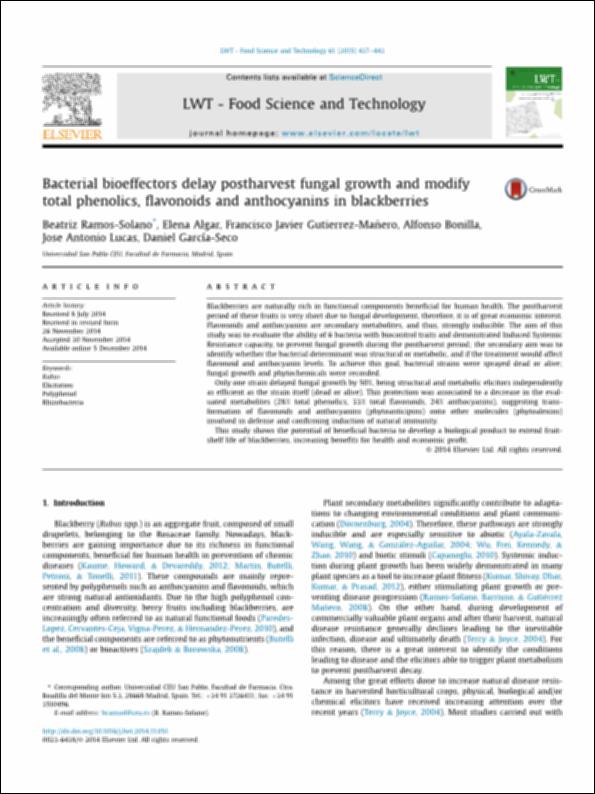Please use this identifier to cite or link to this item:
http://hdl.handle.net/10637/15979Bacterial bioeffectors delay postharvest fungal growth and modify total phenolics, flavonoids and anthocyanins in blackberries
| Title: | Bacterial bioeffectors delay postharvest fungal growth and modify total phenolics, flavonoids and anthocyanins in blackberries |
| Authors : | Ramos Solano, Beatriz Algar, Elena Gutiérrez Mañero, Francisco Bonilla Martínez, Alfonso Lucas García, José Antonio García Seco, Daniel |
| Keywords: | Rubus; Frutas; Rizobacterias; Bacterias |
| Publisher: | Elsevier |
| Citation: | Ramos-Solano, Beatriz, Elena Algar, Francisco Javier Gutierrez-Mañero, Alfonso Bonilla, Jose Antonio Lucas, and Daniel García-Seco. "Bacterial Bioeffectors Delay Postharvest Fungal Growth and Modify Total Phenolics, Flavonoids and Anthocyanins in Blackberries." LWT - Food Science and Technology 61, no. 2 (2015): 437-443 |
| Abstract: | Blackberries are naturally rich in functional components beneficial for human health. The postharvest period of these fruits is very short due to fungal development, therefore, it is of great economic interest. Flavonoids and anthocyanins are secondary metabolites, and thus, strongly inducible. The aim of this study was to evaluate the ability of 6 bacteria with biocontrol traits and demonstrated Induced Systemic Resistance capacity, to prevent fungal growth during the postharvest period; the secondary aim was to identify whether the bacterial determinant was structural or metabolic, and if the treatment would affect flavonoid and anthocyanin levels. To achieve this goal, bacterial strains were sprayed dead or alive; fungal growth and phytochemicals were recorded. Only one strain delayed fungal growth by 50%, being structural and metabolic elicitors independently as efficient as the strain itself (dead or alive). This protection was associated to a decrease in the evaluated metabolites (28% total phenolics, 33% total flavonoids, 24% anthocyanins), suggesting transformation of flavonoids and anthocyanins (phytoanticipins) onto other molecules (phytoalexins) involved in defense and confirming induction of natural immunity. This study shows the potential of beneficial bacteria to develop a biological product to extend fruitshelf life of blackberries, increasing benefits for health and economic profit. |
| URI: | http://hdl.handle.net/10637/15979 |
| Rights : | http://creativecommons.org/licenses/by-nc-nd/4.0/deed.es Open Access |
| ISSN: | 0023-6438 |
| Issue Date: | 5-Dec-2014 |
| Center : | Universidad San Pablo-CEU |
| Appears in Collections: | Facultad de Farmacia |
Items in DSpace are protected by copyright, with all rights reserved, unless otherwise indicated.


